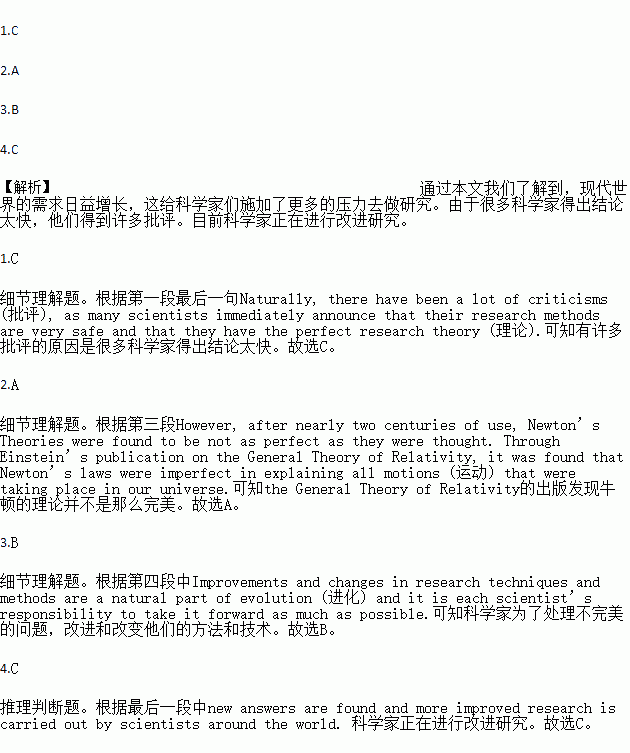题目内容
The demands of the modern world are growing day by day and this is putting more pressure on scientists to do research. However, as stated by Griffiths, “There is no hope of doing perfect research”. Naturally, there have been a lot of criticisms (批评), as many scientists immediately announce that their research methods are very safe and that they have the perfect research theory (理论).
However, scientific history is filled with examples, in which a perfect scientific solution that was based on decades of scientific research has been overturned (推翻) with new theories. Naturally the first example that comes to mind is the fact that Newton’s Theories were thought to be very safe and they were used in all fields of science. For centuries, thousands of scientists around the world used Newton’s Theories to formulate (规划) other theories.
However, after nearly two centuries of use, Newton’s Theories were found to be not as perfect as they were thought. Through Einstein’s publication on the General Theory of Relativity, it was found that Newton’s laws were imperfect in explaining all motions (运动) that were taking place in our universe. It was found to be imperfect under some conditions, even though, Newton’s laws are still used today to predict motion at low speeds.
Thus, perfect research is only a myth (神话). Of course, this does not mean that a scientist should simply give up and accept imperfection in his or her research efforts. Improvements and changes in research techniques and methods are a natural part of evolution (进化) and it is each scientist’s responsibility to take it forward as much as possible.
While the final answer to the universe’s questions may never exist, a time will come when there will be fewer questions as new answers are found and more improved research is carried out by scientists around the world.
1.Why have there been a lot of criticisms?
A. The modern world demands mor e and more.
B. Scientists have a negative attitude.
C. Many scientists arrive at their conclusions (结论) too fast.
D. Griffiths does not believe what scientists say.
2.Through the publication of the General Theory of Relativity, Newton’s Theories turned out to be ______.
A. not so perfect B. completely wrong C. very safe D. very exact
3.What will scientists do to deal with the “imperfectness” problem?
A. Accept the fact and give up.
B. Improve and change their methods and techniques.
C. Try their best to carry out the perfect study.
D. Ignore it and do as they please.
4.We can learn from the last paragraph that ______.
A. the universe’s questions are sure to have a final answer
B. the number of questions is sure to increase with the passing of time
C. scientists are carrying out improved studies
D. there will be more scientists in the world in the future

